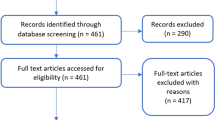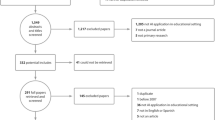Abstract
The traditional classes in colleges and universities are no longer fitted to the distinctive requirements of our society in terms of teaching, research, curricular settings, teaching resource allocation, and teaching quality evaluation. Machine learning approaches based on Internet technology are increasingly being introduced into classrooms and implemented across colleges and universities around the globe. To address the limitations of existing approaches of physical education in colleges and universities, this research employs the classical multivariate statistical technique of factor analysis along with an iterative random forest algorithm. To evaluate the characteristics of machine learning for physical education curriculum, a comprehensive evaluation is performed, and an optimized development strategy is proposed to promote the machine learning-based physical education. Numerous tests were carried out using machine learning classifiers and random forest’s decision tree. The experimental findings reveal that the suggested approach performs better than current models in terms of evaluation’s weight accuracy and calculation time. As a consequence, the suggested model may better match the standards of physical education teaching quality evaluation, i.e., the study's findings are precise and substantial, demonstrating the study's effectiveness.







Similar content being viewed by others

Data avaliability
The codes written to run the simulations presented in this paper are available upon request to the authors.
References
Chen GS (2007) The changing concept of “course.” J JiangSu Educ Inst 2:8–11
Fan D, Zhang L (2021) Research on mixed teaching of university computer in MOOC and Rain Classroom. In: E3S web of conferences, 2021
Hao DY (1997) Discussion on the essence of the curriculum. Curricul Textbook Teach Method
Hao MJ (2004) Ideological analysis of modern curriculum. J Chongq Norm Univ 5:94–98
Harlen W, Crick RD, Broadfoot P, et al (2002) A systematic review of the impact of summative assessment and tests on students’ motivation for learning, evidence for policy and practice, London, UK
Jiang GJ (2006) A quiz on the etymology of “curriculum” and “teaching”–and discussion with Mr. Zhang Xiaoqian. J East China Norm Univ 4:68–71
Jin YL (2001) A critical analysis of curriculum definition. J Jiaozuo Educ Inst 1:4–9
Juan JW (2007) The generalization of curriculum concept and its crisis. Contemp Educ Sci 8:37–40
Kashi A, Shastri S, Deshpande AR, Doreswamy J, Srinivasa G (2016) A score recommendation system towards automating assessment in professional courses. In: Proceedings of the 2016 IEEE eighth international conference on technology for education (T4E), Mumbai, India, pp 140–143
Kotturi Y, Kulkarni CE, Bernstein MS, Klemmer S (2015) Structure and messaging techniques for online peer learning systems that increase stickiness. In: Proceedings of the second (2015) ACM conference on learning@ Scale, Vancouver, Canada, pp 31–38
Krause M, Mogalle M, Pohl H, Williams JJ (2015) A playful game changer: fostering student retention in online education with social gamification. In: Proceedings of the Second
Le LT, Shah C, Choi E (2016) Evaluating the quality of educational answers in community question-answering. In: Proceedings of the 2016 IEEE/ACM joint conference on digital libraries (JCDL), Austin, TX, pp 129–138
Li Y (2018) An application of EDM: design of a new online system for correcting exam paper. In: Proceedings of the 2018 13th international conference on computer science & education (ICCSE), Colombo, Sri Lanka, pp 1–6
Linkens DA, Chen MY (1995) Expert control systems 2@ Design principles and methods. Eng Appl Artific Intell 8(5):527–537
Liu L (2021) Research on IT English flipped classroom teaching model based on SPOC. Sci Program 2021(5):9
Luan J (2002) Data mining and its applications in higher education. New Dir Inst Res 113:17–36
Mohamed SP, Baskar S, Hassan F et al (2021) Internet of things forensic data analysis using machine learning to identify roots of data scavenging. Future Generat Comput Syst 115:756–768
Pozas M, Letzel V (2021) Do you think you have what it takes? Exploring predictors of pre-service teachers’ prospective ICT use. Technol Know Learn. https://doi.org/10.1007/s10758-021-09551-0
Qian NJ, Zhen PW (2018) Research on college physical education curriculum and teaching reform. Station Sports Goods Technol 13
Qiao PG (2013) Study on the cultivation of students’ humanistic quality in normal universities. Educ Theory Pract 15:39–41
RajanVaish SNS, Kovacs G, Veit A, et al (2017) Crowd research, open and Scalable University Laboratories, HangZhou, China
Sun Q (2021) Evaluation model of classroom teaching quality based on improved RVM algorithm and knowledge recommendation. J Intell Fuzzy Syst 40(2):2457–2467
Watson P, Ma T, Tejwani R, Chang M, Ahn J, Sundararajan S (2018) Human-level multiple choice question guessing without domain knowledge: machine-learning of framing effects. In: Proceedings of the companion proceedings of the web conference 2018, Lyon, France, pp 299–303
Ying HZ (2009) The development and thinking of the normal characteristics of higher normal education in modern China. J Nanjing Univ Sci Technol 4:90–93
Zhang XQ, Du CX (2005) The evolution of Chinese curriculum concepts from tradition to modern times. J East China Norm Univ 4:65–74
Funding
The paper did not receive any financial support.
Author information
Authors and Affiliations
Corresponding author
Ethics declarations
Conflict of interest
The author declares that there is no conflicts of interest to the publication of this work.
Ethical Approval
This paper does not deal with any ethical problems.
Informed Consent
I declare an informed consent.
Additional information
Communicated by Tiancheng Yang.
Publisher's Note
Springer Nature remains neutral with regard to jurisdictional claims in published maps and institutional affiliations.
Rights and permissions
About this article
Cite this article
Hu, C. Evaluation of physical education classes in colleges and universities using machine learning. Soft Comput 26, 10765–10773 (2022). https://doi.org/10.1007/s00500-022-06983-3
Accepted:
Published:
Issue Date:
DOI: https://doi.org/10.1007/s00500-022-06983-3



